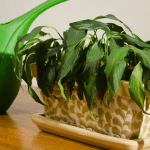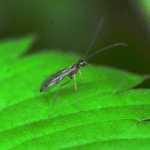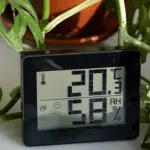
In general, houseplants need less fertilizer in winter because growth has slowed or even stopped (depending on the plant). However, there are some exceptions to this rule. In this post, I’ll cover all aspects of fertilizing indoor plants in winter to keep them thriving until spring.
How Often to Fertilize Indoor Plants in Winter
Most plants require no fertilizer in the winter. In fact, you’re likely to cause more harm than good if you feed them when they’re not actively growing. But this is a general rule. There are some plants that need feeding in winter, and the frequency depends on the type of plant.
Here are some general guidelines on fertilizing indoor plants in winter:
- FOLIAGE PLANTS – Most foliage plants need a rest period where they are not fertilized during winter. Foliage plants are those grown for their leaves that don’t usually flower as houseplants. These include plants like Chinese evergreen, pothos, snake plant, and corn plant (among many, many others).
- FLOWERING PLANTS – Most plants that flower in spring, summer, or fall also need a rest period in winter just like foliage plants. Always check individual care guidelines for your specific plants if you aren’t sure. But in general, if plants don’t flower in winter, they most likely don’t need feeding in winter.
- WINTER-FLOWERING PLANTS – Winter-flowering plants like rieger begonias and Christmas cactus still require feeding in the winter. They need the nutrients to produce blooms. In general, feed them once a month or every two weeks with diluted fertilizer, depending on the plant’s needs.
- ARTIFICIAL LIGHTS – Any houseplants grown under artificial plant lights should be fertilized in winter too. Since they receive the same amount of light, they don’t have a rest period and need the nutrients to support active growth. Feed as you would in spring through fall – once a month or so, depending on the plant.
I keep my plants growing all year under artificial lights. They’ve been thriving under this light from Amazon. But I also have to fertilize them all year long. If you grow under lights, ignore care instructions to stop feeding in winter. Your plants need food to keep growing!
Tips on Fertilizing Indoor Plants in Winter
Fertilize your houseplants anytime they are actively growing, which for most plants is spring through fall – when light levels are still high. The shorter days of winter trigger a resting period for most plants (with a few exceptions). Do not feed them during this time.
For the best results, fertilize your houseplants for the last time in the beginning of October, then don’t feed again until early spring – around the last week of March. This gives your plants time to rest while temperatures are cool and light levels are less bright.
If you aren’t sure if your particular houseplant needs fertilizer in the winter, err on the side of caution. It’s better to under-feed than to over-fertilize. Always look up your plant’s specific care guidelines to find out its recommended feeding schedule.
How to Fix Over-Fertilized Houseplants
If you fertilized a plant in winter that should not have been fed, you can fix the problem if you act quickly. You’ll need to leech the pot to remove any built up fertilizer salts from the soil. Follow these steps as soon as possible:
- Place your plant in a sink or tub where it can easily drain. If it’s a large plant, use a bathtub or place it outside on the ground.
- Water thoroughly with plenty of clean, tepid water. Make sure it’s not too hot or too cold, as you don’t want to shock the roots.
- Allow excess water to drip out through the drainage holes for at least 30 minutes, then repeat by drenching the pots again.
- Repeat one final time (for a total of three times) to remove any built up fertilizer salts.
As long as too much damage hasn’t been done, your plant should spring back in a few days to a few weeks after leeching the pots. Some plants are more sensitive than others. If too much damage has been done it might be impossible to save your plant. But it never hurts to try!
Best Houseplant Fertilizer For Winter
Choose the highest quality fertilizer for your plants that bloom in winter (or that grow under artificial lights in winter). While the best type depends on your plant, I generally prefer Jack’s Houseplant Fertilizers. There are several kinds and I’ve had great success with them.
- Jack’s All-Purpose Plant Food – This is a great all-purpose houseplant fertilizer you can use on all your houseplants. It works great on foliage plants and flowering plants of all kinds.
- Jack’s Blossom Booster – I use Jack’s Blossom Booster on most of my flowering houseplants. It has a1:3:2 nutrient formula that’s proven to produce more flowers and brighter colors on all indoor and outdoor plants. It works wonders on my indoor begonias!
- Jack’s Houseplant Special – This one is fantastic for foliage plants. It has high nitrogen, so it encourages the growth of strong roots and healthy green leaves. Although I started with Jack’s All-Purpose, I now use the Houseplant Special on most of my foliage plants.
Read my review of Jack’s Fertilizer to see why I love it so much! It’s truly the best houseplant fertilizer on the market in my opinion (and I’ve tried them all).
Related Questions
Here are some frequently asked questions related to fertilizing indoor plants in winter that you might find helpful (and my answers to them).
Should I Fertilize Indoor Plants in Winter?
Only if they bloom in winter or you’re growing them under artificial plant lights. Otherwise, the shorter winter days bring on a period of rest where plants do not need fertilizer. Most foliage and many flowering plants have slower growth in winter, and feeding them may cause harm.
If you’re not sure about your specific plant, always check its specific care guidelines for feeding recommendations.
What Happens if You Fertilize Plants in Winter?
If you fertilize a plant in winter that is not actively growing, you’ve wasted your time and money. But more importantly, you may have cause excess fertilizer to build up in the soil. As your plants are semi-dormant in winter, they can’t use the nutrients. When fertilizer salts accumulate, they can damage the plant’s roots and cause “fertilizer burn.”
If your plant is still actively growing under artificial lights or it’s a winter-blooming houseplant, fertilizing it in winter will not cause any harm. And it may be beneficial to support new growth.




